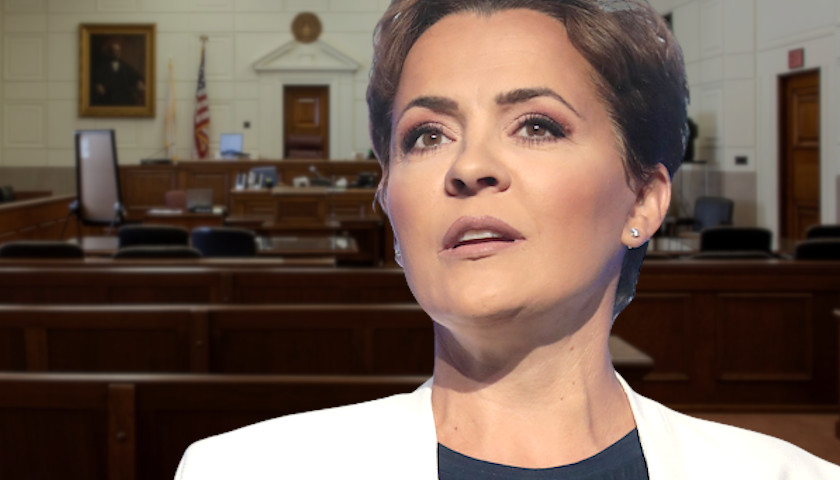Kari Lake, the leading Arizona gubernatorial candidate filed an amicus curiae brief with the Arizona Supreme Court in the case Arizona Republican Party v. Hobbs, which asks the court to compel Arizona Secretary of State Katie Hobbs, a Democrat who is also running for governor, to include signature verification procedures in the state election procedures manual and remove the language she added authorizing the setup of unmonitored ballot drop boxes. Additionally, it challenges “no-excuse” early ballots as violating the Arizona Constitution.
Lake said in a statement, “Voters have made it very clear that they are demanding nothing less than completely secure elections and we’re going to give it to them come hell or high water.”
She said a forensic investigation earlier this year along with a canvass of absentee voters, which uncovered tens of thousands of irregularities with ballots cast in the 2020 general election, compelled her to enter the lawsuit.
Lake called for Hobbs to recuse herself from overseeing the gubernatorial race back in July, citing her “history of irrational bias and disdain toward Republicans in addition to what election investigators have reported to the public about serious issues affecting tens of thousands of ballots and voters.”
In the amicus brief, Lake explained further why she felt intervening was warranted. The brief states, “One of the first things she noticed is the high level of interest that the people of the State have in an election system that produces an actual winner on Election Night, not days or weeks later. Many voters have been registered for long enough to remember what that was like.”
Another problem she cited hearing from voters is being “pressured in the past to submit their mail-in ballots to elections officials or to simply give them to a third party for that person or persons to turn in. This type of a system is simply not consistent with secret balloting.”
She felt the need to speak out because “people vote for candidates and ballot measures at elections, but only candidates have the ability to speak.”
The lawsuit asks to eliminate no-excuse mail-in voting, which would be significant considering Arizona has used no-excuse mail-in voting for years. The suit relies on an older case in Kentucky and a current case in Pennsylvania where the court found that mail-in ballots were unconstitutional since they were implemented without changing the state constitution. Arizona has a similar constitution to Pennsylvania’s. Arizona’s constitution uses a considerable amount of language indicating that voting will be done “at the polls.”
Another part of the lawsuit asks the court to prevent Hobbs from setting up ballot drop boxes, including unmonitored ones, since there is no authority for her to do so in law, and they would circumvent ID requirements. A third part of the lawsuit asks the court to compel Hobbs to add signature verification requirements to the state elections manual because without them there is no requirement for county recorders.
Hobbs has come under attack more than once for refusing to defend Arizona’s election integrity laws, prompting Arizona Attorney General Mark Brnovich to step in instead. He successfully won Brnovich v. DNC at the U.S. Supreme Court, upholding the state’s ban on ballot harvesting and the requirement that voters cast ballots within their own precincts.
Brnovich refused to approve Hobbs’ changes to the state election manual in December due to concern they could lead to criminal penalties. Hobbs inserted a provision that would allow voters to cast ballots at precincts other than their own — defeating the ruling in Brnovich v. DNC.
Hobbs attracted scandal in the gubernatorial race in December when a former staffer of hers at the Arizona Legislature was awarded $2.5 million for race and sex discrimination after Hobbs fired her. Hobbs admitted, “… I participated in furthering systemic racism.”
Lake is currently polling higher than all other Republican candidates in the gubernatorial race combined, and in a general matchup against Hobbs she beats her 42.7% to 41.4%. The original lawsuit was filed on February 25 and is awaiting a hearing.
– – –
Rachel Alexander is a reporter at the Arizona Sun Times and The Star News Network. Follow Rachel on Twitter. Email tips to [email protected].
Photo “Kari Lake” by Gage Skidmore. CC BY-SA 2.0.








